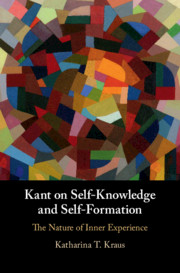Book contents
- Kant on Self-Knowledge and Self-Formation
- Kant on Self-Knowledge and Self-Formation
- Copyright page
- Dedication
- Epigraph
- Contents
- Figures
- Table
- Preface
- Introduction From Inner Experience to the Self-Formation of Psychological Persons
- Part I The Appearing Self
- 1 Inner Sense as the Faculty for Inner Receptivity
- 2 Temporal Consciousness and Inner Perception
- Part II Self-Consciousness and the “I” of the Understanding
- Part III The Human Person and the Demands of Reason
- Bibliography
- Index
1 - Inner Sense as the Faculty for Inner Receptivity
from Part I - The Appearing Self
Published online by Cambridge University Press: 01 December 2020
- Kant on Self-Knowledge and Self-Formation
- Kant on Self-Knowledge and Self-Formation
- Copyright page
- Dedication
- Epigraph
- Contents
- Figures
- Table
- Preface
- Introduction From Inner Experience to the Self-Formation of Psychological Persons
- Part I The Appearing Self
- 1 Inner Sense as the Faculty for Inner Receptivity
- 2 Temporal Consciousness and Inner Perception
- Part II Self-Consciousness and the “I” of the Understanding
- Part III The Human Person and the Demands of Reason
- Bibliography
- Index
Summary
Chapter 1, “Inner Sense as the Faculty for Inner Receptivity”, sets the stage by introducing Kant’s basic model of representation and by defining two pairs of concepts that will guide my analysis: reflexivity and referentiality, on the one hand, and objective and subjective validity on the other. Through an examination of the historical context, the chapter develops an account of inner sense as a transcendental faculty of sensibility, and gives preliminary accounts of central concepts, including affection, sensation, appearance, intuition, perception, and experience. As a result, the chapter suggests that – by analogy with outer sense – inner sense receives inner appearances and yields distinctively inner intuition according to its specific form, i.e., time. The full argument for this claim will be put forward only in Chapter 2. Finally, by considering insights concerning the faculties for desire and feeling from the third Critique and the Anthropology, the chapter develops a broader notion of inner receptivity as susceptibility to all mind-internal causes.
Keywords
- Type
- Chapter
- Information
- Kant on Self-Knowledge and Self-FormationThe Nature of Inner Experience, pp. 17 - 42Publisher: Cambridge University PressPrint publication year: 2020

